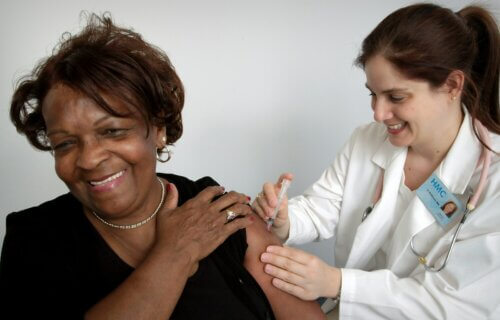TORONTO — When it comes to long-term COVID immunity, new research out of Canada suggests boosters are better than your original shot. Researchers from York University’s Centre for Disease Modeling in the Faculty of Science report that immunity following a COVID-19 booster shot lasts much longer than the primary series alone.
The research team behind this conclusion, York Post Doctoral researchers Chapin Korosec and David Dick, Applied Mathematics Professor Iain Moyles, and Professor James Watmough from the University of New Brunswick, made use of health data submitted to the COVID Immunity Task-Force project encompassing over 150 people who received either the Pfizer-BioNTech or Moderna COVID-19 vaccine. The study author’s main aim was to gauge how immunity holds up over time.
“Our approach as mathematicians is to create mathematical models of the immune system, and then calibrate those models to health care data in order to advance our understanding of the human immune system. It was really interesting to see the SARS-CoV-2 booster dose have such a huge increase in protective longevity capacity as compared to the primary series of two doses,” says Korosec, the study’s lead author, in a media release.
The study used Canadian vaccine data gathered from individuals living in long-term care, in addition to frontline healthcare workers working in long-term care and hospitals. Among the group as a whole, the average length for the antibody half-life immune response was 63 days for the primary series – which increased to 115 days for those who received a booster shot at a later date.
Studies during the pandemic established that age may influence how adept a body is at priming an immune response following vaccination. Advanced age itself is even considered a comorbidity, Korosec notes.
“Chronological age is your time since birth. But you also have an immunological age, which is correlated to your chronological age, and is related to how your body loses its ability to prime against invading pathogens and produce antibodies as time marches on,” Korosec explains. “What’s convoluted is that as we age chronologically, the probability that we accrue diseases that can affect the immune system in unintuitive ways also increases.”

Upon researching this aspect specifically, researchers discovered that older adults did show a less long-lasting immune response. Importantly, however, once researchers controlled for co-morbidities (hypertension, lung disease, cancer, etc.), age no longer displayed a significant influence on the immune response.
Additional noteworthy findings include a small but still statistically significant immune response for men versus women. People with asthma also showed a longer-lasting immune response — more durable than people with hybrid immunity from vaccines and contracting COVID-19.
“We found that some outcomes were surprising and worth further study, but of course we’re not advocating any particular comorbidity is beneficial,” Dick reports. “We don’t have any information from this study on how asthma would affect the severity of the COVID-19 illness, for example.”
Besides the main findings, researchers also add their study points to the importance of interdisciplinary research. They are excited about possibilities for collaboration moving forward, with plans to open York’s medical school in 2028.
“While we’re all from math and stats departments, the data comes from clinicians who went through medical school and are now professors studying immunology, and I think this study shows how people with different skill sets can come together and do really interesting science,” Korosec says.
“We have a really top applied math program at York, and now the university has announced a medical school. Imagine these clinicians were at York and we had access to the data on the ground floor. This would cut the research timeline by years and has huge potential for future interdisciplinary research at the university,” Prof. Moyles concludes.
The study is published in Scientific Reports.
